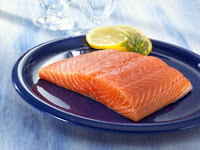
Living green means many different things to me... living simply, making wise choices, eating local, recycling, reusing, reducing, choosing toxin free everything, etc., etc.
In terms of food, I've always felt it's best for my health and my wallet to eat in, using fresh ingredients I've purchased and prepared - better yet if those ingredients are from my local farmer's market.
Not to say I don't eat out, I do. I LOVE restaurants and take-outs offering natural (I should be careful with that word, mercury after all is
natural...), wholesome, healthful food, and I'm very fortunate to have quite a few local places, that make fabulous food from scratch.
So as I share this
article about McDonald's Chicken McNuggets, I'm wondering why on earth you'd add
dimethylpolysiloxane, an anti-foaming agent made of silicone, to fried chicken? And what would even make someone think of adding it to food?
Let alone
tertiary butylhydroquinone (
TBHQ), a chemical preservative and form of butane, that according to according to
A Consumer’s Dictionary of Food Additives, is so deadly that just five grams can kill you!
I think most Americans are well aware that deep fried McNuggets aren't the healthiest choice, but that they contain an anti-foaming agent made of silicone. I'll guess that's a surprise.
Organic Authority recently posted the full ingredients list provided by
McDonald's website, for their Chicken McNuggets:
"White boneless chicken, water, food starch-modified, salt, seasoning (autolyzed yeast extract, salt, wheat starch, natural flavoring (botanical source), safflower oil, dextrose, citric acid, rosemary), sodium phosphates, seasoning (canola oil, mono- and diglycerides, extractives of rosemary).
Battered and breaded with: water, enriched flour (bleached wheat flour, niacin, reduced iron, thiamin mononitrate, riboflavin, folic acid), yellow corn flour, food starch-modified, salt, leavening (baking soda, sodium acid pyrophosphate, sodium aluminum phosphate, monocalcium phosphate, calcium lactate), spices, wheat starch, whey, corn starch.
Prepared in vegetable oil (Canola oil, corn oil, soybean oil, hydrogenated soybean oil with
TBHQ and citric acid added to preserve freshness).
Dimethylpolysiloxane added as an antifoaming agent."
As a dear friend, who also happens to be an M.D says, "
if you really must have fried chicken (or something equally high cal and unhealthy ie: french fries),
eat it as often as you're willing to make it at home, from scratch."
In my opinion, the McNuggets ingredient list gives you another reason to make it yourself... as for me, I'm headed over to Bartlett's Farm for some fresh ingredients for a delicious (and healthy) soup.
Best of Health,
Susan
 The average American may be shocked to know just how much expired, unneeded, spoiled and/or unwanted pharmaceuticals end up in our waterways. Most would think why is this a worry... a few pills tossed down the toilet is a quick and easy way to dispose of leftover or unwanted prescription medications, and what can the harm be?
The average American may be shocked to know just how much expired, unneeded, spoiled and/or unwanted pharmaceuticals end up in our waterways. Most would think why is this a worry... a few pills tossed down the toilet is a quick and easy way to dispose of leftover or unwanted prescription medications, and what can the harm be?

















